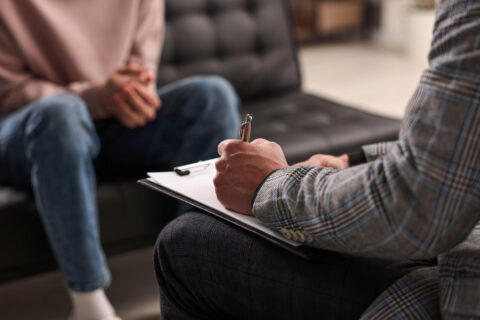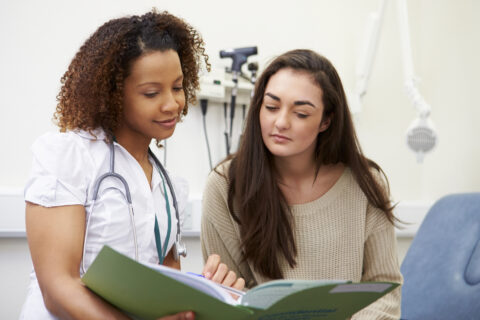June is National Pride Month, a time to celebrate, honor, and recognize people who are lesbian, gay, transgender, bisexual, or queer.
This national month-long celebration helps highlight the most influential LGBTQ+ people and their contributions. It also sheds light on issues still faced by people who are LGBTQ, from barriers to healthcare, wage gaps, daily discrimination, and addiction rates.
People in the LGBTQ+ community face higher addiction (substance abuse) rates than their straight counterparts. Yet with swift and effective treatment, we can aid more people in seeking addiction recovery and preventing drug and alcohol abuse in LGBTQ teens and adults.
How Pride Month Draws Attention to Addiction in the LGBTQ+ Community
LGBT Pride Month, or simply Pride Month, draws attention to many issues the LGBTQ+ community faces, from higher rates of suicide to mental health issues to bullying and drug use.
Many of these issues are interlinked, and often begin in childhood. While the U.S. has made strides toward inclusivity and creating a better world for all in the past few decades, people who identify as LGBTQ+ still face daily hardships.
Some include discrimination at work and school, prejudice about gender identity, sexuality, pay gaps, and increased risk of many health and mental illness issues. Without a doubt, LGBTQ+ individuals face barriers that the general population never experiences.
Pride Month works to not only highlight people in the LGBTQ+ community, but also to raise awareness of these issues and help prompt meaningful, lasting changes.
For example, getting affirming treatment in a welcoming healthcare treatment program could help more LGBTQ+ people find recovery from a substance use disorder (SUD).
Alcohol and Drug Use Rates Among LGBTQ+
Regardless of sexual orientation or gender identity, many people use alcohol and drugs as a way to cope with hardships in their lives.
However, this is especially true among the LGBTQ+ community.
In fact, research from the Behavioral Health Care Access Among Lesbian, Gay, and Bisexual Populations on past year substance use shows that both males and females in sexual minorities were 2-3 times more likely than straight people to use substances.
Substances include:
- Marijuana
- Cocaine
- Inhalants
- Methamphetamine (meth)
- Alcohol
- Cigarettes
- Misuse of prescription drugs such as opioids and amphetamines
Factors in LGBTQ Substance Abuse Rates
There may be many factors that lead to substance use in lesbian, gay, bisexual, and transgender individuals. Perhaps the greatest factor is needing a way to cope with minority stress and negative experiences.
For many LGBTQ+ people, stressors begin in youth in an unsupportive or anti-LGBTQ environment. Young people may turn to alcohol or drugs as a way to self-medicate their anguish.
With time, this use can lead to drug or alcohol addiction.
Other factors that may impact substance abuse in LGBTQ+ people:
- Fear of rejection
- Social stigma
- Discrimination
- Harassment
- Violence/hate crimes
- Internalized stigma/homophobia
Long Term Effects of Addiction for People Who Are LGBTQ+
On top of facing addiction, members of the LGBTQ+ community may avoid seeking help for it. Despite healthcare laws making discrimination illegal, many LGBTQ+ people still face prejudice in healthcare settings.
This can make them fear revealing their sexual identity, or deter them from getting help altogether.
And addiction can have negative health outcomes when left untreated, like:
- Impact on mental health conditions
- Heart health problems
- Lung health issues
- Stroke
- Increased risk of cancer
- Hepatitis B and C
- Effects on pregnancy and breastfeeding
- Financial strain
- Strained relationships
- Increased crime rates
Why Aren’t More LGBTQ+ People in Addiction Recovery?
Many healthcare providers still restrict services to people in LGBTQ-populations. Although laws are in place to protect all North Americans from discrimination in medical settings.
However, other laws have since been approved that may allow providers to get around it — for religious reasons. And being LGBTQ+ is not acceptable in most western religions.
States with laws allowing healthcare providers to deny services based on religious reasons include:
- South Carolina
- Mississippi
- Arkansas
- Tennessee
- Florida
- Ohio
In short, if lesbian, bisexual, gay, queer, and transgender people could access treatment centers that do not discriminate, they may experience greater rates of addiction recovery.
Barriers to Effective Addiction Treatment for LGBTQ+ People
In addition to being outright denied access to healthcare, LBGTQ+ people also face other barriers to getting addiction treatment.
Limited Availability
There is well-documented need for addiction recovery care and a high prevalence of alcohol and drug use in LGBTQ+ youth and adults. Unfortunately, there are few treatment options available.
This includes few programs that are LGBTQ-inclusive and many treatment centers which discriminate based on gender or sexual identity.
Non-Discriminatory vs. Non-Affirming Care
There is also quite a difference between care that doesn’t discriminate against, for example, gay men, and care that actually affirms your gender identity.
People who are in LGBTQ addiction treatment programs which are not inclusive or geared toward the LGBTQ+ community may not experience safe spaces for recovery.
Affirming care makes a vast difference in your recovery and in fact improves your mental and physical well-being overall.
How Can We Improve Addiction Recovery Rates in the LGBTQ+ Community?
There are a great many ways to improve both addiction and addiction recovery rates for LGBTQ+ people.
Here are some actionable ways to get started:
- Offer more LGBTQ+ addiction treatment programs. Such as the LGBTQ-inclusive rehab program at Otter House Wellness.
- Focus on laws that prevent discrimination. Legislation is the greatest way to foster change, and advocacy is crucial. Reach out to your state representatives, vote for non-discrimination laws, and work toward change.
- Be an ally. Whether you or a loved one are LGBTQ+, offer your support, and use your voice to raise awareness and foster a more inclusive world.
- Support LGBTQ+ organizations. These advocates are doing the real work every day, not just during Pride Month, to ensure LGBTQ+ individuals experience the same rights as everyone else.
Find LGBTQ+ Inclusive Care at Otter House Wellness
Pride Month is an important time to highlight the achievements of the LGBTQ+ community and to draw attention to issues they still face, like addiction.
If you are LGBTQ+ and looking for an affirming addiction rehab program in North Carolina, we can help.
Learn more about our intensive, effective outpatient rehab programs that are inclusive and welcoming in a homey environment. Contact us today to begin your recovery in a safe space.
Sources
- American Progress. “The Harms of Refusing Service to LGBTQ People and Other Marginalized Communities.” Retrieved from: https://www.americanprogress.org/article/harms-refusing-service-lgbtq-people-marginalized-communities/. Accessed July 11, 2025.
- Human Rights Campaign. “Celebrate Pride With Us: We Show Up.” Retrieved from: https://www.hrc.org/campaigns/celebrate-pride-with-us. Accessed July 11, 2025.
- National Library of Medicine. “The availability of LGBT‐specific mental health and substance abuse treatment in the United States.” Retrieved from: https://www.ncbi.nlm.nih.gov/pmc/articles/PMC7704474/. Accessed July 11, 2025.
- Substance Abuse and Mental Health Services Administration. “Behavioral Health Care Access Among Lesbian, Gay, Bisexual and Transgender Populations.” Retrieved from: https://library.samhsa.gov/sites/default/files/cfri-lgb-report-pep24-07-026.pdf. Accessed July 11, 2025.
Facility Staff
June 13, 2024
- North Carolina IOP in Cabarrus County
 North Carolina IOP in Cabarrus County depends on solid diagnosis tools to give you the right intensity of care. Let’s explore some important tools used for this purpose.
North Carolina IOP in Cabarrus County depends on solid diagnosis tools to give you the right intensity of care. Let’s explore some important tools used for this purpose. - IOP & Recovery Support Near Iredell County, NC
 Don’t pause your life to get better. IOP and recovery support near Iredell County, NC, is a reliable model for multiple problems. Let’s learn more about it.
Don’t pause your life to get better. IOP and recovery support near Iredell County, NC, is a reliable model for multiple problems. Let’s learn more about it. - Outpatient Mental Health IOP in Alexander County, NC
 Mental health IOP in Alexander County, NC, is proving to be incredible for the locals, but there are some caveats. Learn important things about this program and start with clarity.
Mental health IOP in Alexander County, NC, is proving to be incredible for the locals, but there are some caveats. Learn important things about this program and start with clarity. - Mental Health & IOP in Gaston County, NC
 The benefits of IOP in Gaston County, NC, for mental health are endless. This program doesn’t bind you or make you feel vulnerable. Let’s explore its strengths in detail.
The benefits of IOP in Gaston County, NC, for mental health are endless. This program doesn’t bind you or make you feel vulnerable. Let’s explore its strengths in detail. - IOP Services Near Lenoir County, NC
 Struggling but unable to step away from life? Learn how IOP services near Lenoir County offer structured recovery without hospital stays.
Struggling but unable to step away from life? Learn how IOP services near Lenoir County offer structured recovery without hospital stays. - IOP Treatment Near Catawba County, NC
 What Happens if You Face a Crisis During IOP Treatment Near Catawaba County, NC? Starting a mental health treatment (even if it’s as rigorous as an intensive outpatient or inpatient plan) doesn’t mean there won’t be hard moments. You can still have meltdowns where everything seems to be crashing down on you, and the weight… Read more: IOP Treatment Near Catawba County, NC
What Happens if You Face a Crisis During IOP Treatment Near Catawaba County, NC? Starting a mental health treatment (even if it’s as rigorous as an intensive outpatient or inpatient plan) doesn’t mean there won’t be hard moments. You can still have meltdowns where everything seems to be crashing down on you, and the weight… Read more: IOP Treatment Near Catawba County, NC - IOP & Behavioral Health Resources in Buncombe County, NC
 IOP & behavioral health resources in Buncombe County, NC, make sure you don’t feel isolated or too restricted. Let’s explore how these resources are changing lives for the better.
IOP & behavioral health resources in Buncombe County, NC, make sure you don’t feel isolated or too restricted. Let’s explore how these resources are changing lives for the better. - Outpatient Mental Health & IOP in Pitt County, NC
 Anxiety and depression don’t stop for ECU schedules or work shifts. Learn how outpatient mental health and IOP care supports Pitt County residents.
Anxiety and depression don’t stop for ECU schedules or work shifts. Learn how outpatient mental health and IOP care supports Pitt County residents. - Behavioral Health IOP in Onslow County, NC
 Weekly therapy not enough, but hospitalization feels too much? Learn how Behavioral Health IOP in Onslow County offers structured support without pausing your life.
Weekly therapy not enough, but hospitalization feels too much? Learn how Behavioral Health IOP in Onslow County offers structured support without pausing your life. - North Carolina IOP in Forsyth County
 When you hit a wall in therapy, North Carolina IOP in Forsyth County can fix that. Learn how this model moves beyond the limitations of therapy for proper healing.
When you hit a wall in therapy, North Carolina IOP in Forsyth County can fix that. Learn how this model moves beyond the limitations of therapy for proper healing.
Recommended Blogs


North Carolina IOP in Cabarrus County
Diagnosis Tools Used During North Carolina IOP in Cabarrus County You might have heard someone…

IOP & Recovery Support Near Iredell County, NC
What Can IOP & Recovery Support Near Iredell County, NC, Treat? Over 1.4 million adults…

Outpatient Mental Health IOP in Alexander County, NC
Things to Know About Outpatient Mental Health IOP in Alexander County, NC Getting help for…







